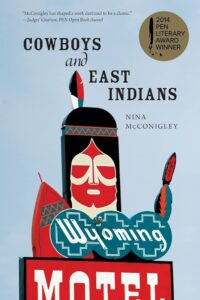
Two Colorado State University professors will each debut plays as part of the Denver Center for the Performing Arts Colorado New Play Summit on Feb. 24 and 25.
For both Colorado State University Assistant Professor Nina McConigley and Visiting Assistant Professor Vauhini Vara this will be the first time they see their writing translated to the stage.
“I’ve done readings, but having it performed in front of an audience is so different,” McConigley said. “I think this will be really amazing to sit in a room and actually see an audience reacting to what you’ve written.”
‘Cowboys and East Indians’
“Cowboys and East Indians” – adapted from McConigley’s award-winning collection of short stories of the same name – follows a family struggling with the expectations and culture collisions of moving from India to Wyoming.
 It was a challenge combining two of the stories into one play, said McConigley, who collaborated on the adaptation with fellow playwright and longtime friend Mathew Spangler.
It was a challenge combining two of the stories into one play, said McConigley, who collaborated on the adaptation with fellow playwright and longtime friend Mathew Spangler.
“It took a while to get them to mesh, but that was also a little hard for me because I had to let go of the original story and add some things in that weren’t there originally,” she said. “A lot of my writing is autobiographical, so part of me struggled with the fact that it didn’t happen that way.”
An important thread that remained was the unique separation of cultural identity that McConigley faced growing up in Wyoming.
“I never really learned to cook (Indian dishes); I never really wore a sari – because it was Wyoming,” she said. “When my mom got cancer, that was when I first really learned to wear a sari and to cook food for her because suddenly, I was terrified that I was going to lose her.”
‘Ghost Variations’
An adaptation of Vara’s acclaimed essay “Ghosts,” “Ghost Variations” follows Vara’s private experiment using AI to write about a personal topic she’d long been unable to approach.
“I’d been reading about this technology called GPT-3 that was a predecessor to ChatGPT,” said Vara, an author and tech journalist. “I had previously written an article about Sam Altman, the CEO of OpenAI, and I asked if I could try out this tool that was in beta testing at the time.”
Vara was intrigued by the technology but wondered how useful it would be for someone like her, an already accomplished writer.
“I started thinking about the one thing in my life that I had always had a hard time expressing, which was the death of my sister when we were younger,” she said.
Vara began by giving GPT-3 the start of a sentence about her sister and then asking it to complete the rest.
“As you might have guessed, it did a terrible job,” she said. “Then I kept adding more of my own language, asking it to do the same thing over and over. I found a kind of interesting and even moving duet emerged, which ended up becoming the nine-part essay ‘Ghosts.’”
When she was later approached about adapting the essay for the stage, it seemed like another intriguing experiment. While the deal ended up falling through, Vara continued working on the play, eventually submitting it to the Colorado New Play Summit.
“It’s really personal material for me, so it will be interesting to see actors playing me, playing my sister,” she said. “I think it will be an intense experience and also one that I’m really looking forward to and excited about.”
Giving a voice
It’s a rare opportunity to be a new playwright and to receive these kinds of resources, including a director, a dramaturg and actors who help bring the text to life, Vara said, adding that the experience has made her “fall in love” with playwriting as a medium.
“The thing that’s interesting about this experience is that ‘Ghosts’ started as an essay,” she said. “It hadn’t occurred to me that it could take another form as well, and this is the first time that I’ve written something that started out in one form and is now evolving into another. I’m interested in understanding the way in which that translation changes the meaning of the piece.”
Vara and McConigley also noted how unusual it was for both of them to be accepted at this year’s summit. To have two of the four accepted playwrights be from CSU, both from the Creative Writing program, both South Asian women, was a surprise, McConigley said.
“We are such different writers, and we’re telling very different stories, so I really appreciate that they didn’t say, ‘Oh we only have room for one South Asian woman playwright,’” she said. “They just picked the stories they were interested in telling.”
About the Colorado New Play Summit
The Denver Center for the Performing Arts’ premiere festival, the Colorado New Play Summit is dedicated to supporting emerging playwrights and developing new work. Selected playwrights work with professional directors, actors and dramaturgs to workshop the plays, ending in a weekend of staged readings for an audience of industry professionals and theater fans.
Since its founding, the Summit has debuted 64 new plays, more than half of which returned to the stage as full productions. Among its world premieres are Samuel D. Hunter’s “The Whale,” which was turned into the film starring Brendan Fraser; José Cruz González’s “American Mariachi;” and Neyla Pekarek and Karen Hartman’s “Rattlesnake Kate.”